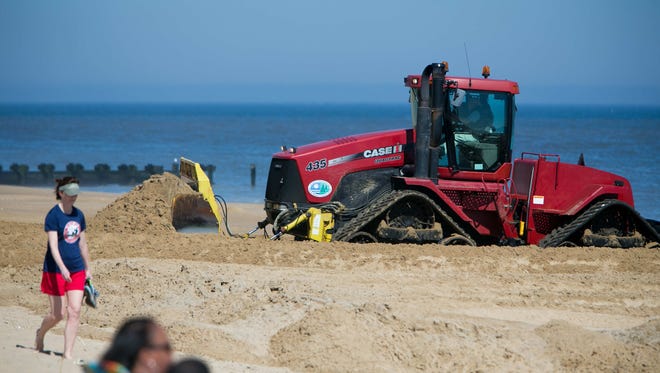Seismic testing still possible along Delaware coast
Oceana is calling for a halt to seismic testing in the area off the Delaware coast to Florida

- Eight permit applications are in place for oil and gas exploration off the coast from Delaware to Florida.
- The conservation group Oceana is calling for a halt to seismic testing.
- Whales, dolphins, sea turtles and a variety of fish species are at risk, according to the organization.
The federal Bureau of Ocean Energy Management is still considering eight permit applications for marine mineral, renewable energy and oil and gas exploration off the coast from Delaware to Florida, despite the decision on March 15 to bar offshore drilling from that stretch of the coast and not sell leases in the coming five years.
The exploration permit requests include one from a California company that wants to do passive surveys by having an airplane fly a grid pattern over the ocean coast to do gravity gradient and magnetic surveying.
Seven applications are seeking permission to conduct 2-D and in some cases 3-D seismic testing. Some of the projects would use air guns. Others would use gravity and magnetics to image the features of the deep sea floor.
Now the conservation group Oceana is calling for a halt to seismic testing in the area.
“With offshore drilling off the table in the Atlantic, there is absolutely no reason to risk the damage that would be caused by unnecessary seismic airgun blasting in the region,” said Claire Douglass, campaign director at Oceana, based in Washington. “The noise from seismic airgun blasting is so loud that it can be heard up to 2,500 miles from the source, which is approximately the distance from Washington, D.C., to Las Vegas."
Oceana created new maps that show essential fish habitats off the coast in relation to the designed exploration field.
"These maps clearly show that seismic airgun blasting could threaten coastal communities, economies, fisheries and marine mammals,” Douglass said.
According to the organization, whales, dolphins, sea turtles and a variety of fish species are at risk.
Several marine species use sound to navigate and find food and habitat. Some researchers are concerned that seismic testing, which uses air guns to send a sound signal through the water column deep below the sea floor, could be disruptive to fish and marine mammals. The sound signals are used to build maps that can be used to locate hidden pockets of oil, natural gas, deep-sea hydrothermal vents and mineral resources.
STORY: Two bald eagles released after rehabilitation
STORY: Land owners allege DNREC staff trespassed to gain info
Joanne Cabry, who lives just outside Rehoboth Beach, said she's concerned that if the testing is allowed to move forward, it could give oil and gas companies the data they need to push for drilling at the end of the five-year ban.
"That worries me," she said. "They have no current data" and if survey work finds deep-sea resources, it could increase pressure on government agencies to open the area up.
The last time the sea floor off the Delaware-Maryland coast was mapped for oil and gas exploration was more than 40 years ago. Pockets of natural gas were discovered, but there was no follow-up exploration. Many in the oil and gas industry argue that significant advances in drilling and extraction techniques make once-challenging locations more accessible.
The Obama administration reversed its year-old plan to sell oil leases for drilling in the Middle and South Atlantic two weeks ago based on two key issues: concerns voiced by residents, coastal mayors and municipalities, including several in Delaware and nearby Maryland, and the Pentagon's worries that offshore drilling could impact operations at the Norfolk Naval Station in Virginia.
Interior Secretary Sally Jewel announced that the Mid- and south Atlantic sales were removed from the 2017-2022 program.
Delaware officials were especially concerned about the potential impact on the state's multibillion-dollar annual coastal tourism industry, a key economic driver in Delaware and Sussex County.

“We heard from many corners that now is not the time to offer oil and gas leasing off the Atlantic coast,” Jewell said. “When you factor in conflicts with national defense, economic activities such as fishing and tourism, and opposition from many local communities, it simply doesn’t make sense to move forward with any lease sales in the coming five years.”
But that decision only impacted lease sales. The eight permit applications for exploration in the area from Delaware Bay south to Florida are still under review.
Oceana’s new maps show both Essential Fish Habitats designated by the National Oceanic and Atmospheric Administration and the seismic testing area designated by the federal Bureau of Ocean Energy Management. These essential habitats are places that are important for fish spawning, breeding and feeding. They can also be areas where threatened and endangered species, like the North Atlantic right whale, congregate.
“We know that the noise from seismic air guns is of special concern to marine life, including fish, turtles and whales, which depend on sound for communication and survival,” said Ingrid Biedron, marine scientist at Oceana. “Numerous studies demonstrate the negative impacts that seismic air gun noise has on ocean ecosystems, including reduced catch rates of fish, stress response in crabs, decline in sperm whale feeding calls and the silencing of bowhead whales."
Delaware Environmental Secretary David Small, in a letter written last April, wrote that seismic surveying shouldn't be allowed off the coast because the area wasn't going to be open to oil and natural gas drilling over the next five years.
A spokesman for the secretary said that position is unchanged.
Reach Molly Murray at (302) 463-3334 or mmurray@delawareonline.com. Follow her on Twitter @MollyMurraytnj.